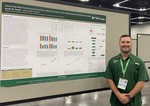Dr. Austin Smith
Postdoctoral Associate Department of Wildlife Ecology & Conservation
University of Florida
About me
I’m a quantitative ecologist and postdoctoral researcher in the Scheffers Lab and Callaghan lab in the Department of Wildlife Ecology & Conservation at the University of Florida, and part of the 2025–2027 USGS Climate Adaptation Postdoctoral (CAP) Fellows Program. My research applies mathematical and statistical methods to ecological questions, focusing on how environmental variability shapes species distributions across space and time. I’m particularly interested in using machine learning and deep learning to improve ecological forecasting, assess habitat suitability, and understand the dynamics of introduced species.
I completed my Ph.D. in Integrative Biology at the University of South Florida, where I was member of the Kramer Lab. My dissertation — “ Species Distribution Modeling with Environmental Time Series Data and Deep Learning” — explored how temporal environmental patterns can inform species distribution models. Before that, I earned a B.A. in Mathematics and an M.S. in Interdisciplinary Ecology from the University of Florida.
In my current postdoctoral work, I’m developing a dynamic, data-driven framework to assess and manage climate-induced species range shifts. This project, in collaboration with the USGS Climate Adaptation Science Center, integrates advanced modeling, multi-source data, and stakeholder engagement to support climate-informed decision-making.
Outside of research, I enjoy biking, hiking, and working with raptors as a lead Bird of Prey handler and educator at Boyd Hill Nature Preserve. I’m also active in Florida’s craft beer community as an original crew member and taproom manager at Cypress & Grove Brewing Co. in Gainesville, FL.
Interests
- Biogeography
- Machine Learning
- Ornithology
- Temporal ecology
Education
-
Ph.D. in Integrative Biology, 2024
University of South Florida, Tampa, FL
-
M.S. in Interdisciplinary Ecology, 2018
University of Florida, Gainesville, FL
-
B.A. in Mathematics, 2013
University of Florida, Gainesville, FL
-
A.A. in Mathematics, 2010
Santa Fe College, Gainesville, FL

